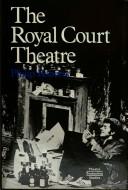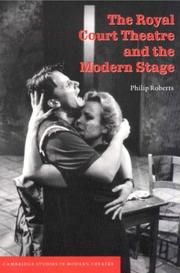| Listing 1 - 8 of 8 |
Sort by
|

ISBN: 1315719266 1317515463 9781317515463 9781315719269 9781317515470 1317515471 9781317515456 1317515455 113885672X 9781138856721 9781138856752 1138856754 0710098065 9780710098061 9781138856721 9780710098061 Year: 2015 Publisher: New York, NY
Abstract | Keywords | Export | Availability | Bookmark
 Loading...
Loading...Choose an application
- Reference Manager
- EndNote
- RefWorks (Direct export to RefWorks)
Book
ISBN: 0273007580 0273007572 Year: 1975 Publisher: London Pitman
Abstract | Keywords | Export | Availability | Bookmark
 Loading...
Loading...Choose an application
- Reference Manager
- EndNote
- RefWorks (Direct export to RefWorks)
Theatrical science --- Great Britain --- Royal Court Theatre --- English Stage Company --- Royal Court Theatre. --- English Stage Company. --- Theatre --- Realisation et direction --- Grande-bretagne

ISBN: 1107112621 1280151889 0511486073 0511149891 0511309902 0511116187 0511053118 0521474388 0511037872 9780511037870 9780511149894 9780511116186 0511007213 9780511007217 9781280151880 9780511486074 9780511309908 9780511053115 9780521474382 0521479622 9780521479622 9781107112629 0511092709 Year: 1999 Publisher: Cambridge New York, NY Cambridge University Press
Abstract | Keywords | Export | Availability | Bookmark
 Loading...
Loading...Choose an application
- Reference Manager
- EndNote
- RefWorks (Direct export to RefWorks)
The Royal Court Theatre is one of the primary forums in the development of post-war drama. Under the title of the English Stage Company the theatre's house actors and dramatists commissioned and produced some of the most influential plays in modern theatre history, including the works of Brenton, Churchill, Bond and Osborne. The story of the Royal Court is also the history of the contemporary stage. In this absorbing account of the theatre's history from 1956 to 1998, first published in 1999, Philip Roberts draws on previously unpublished archives in both public and private collections and a series of interviews with people prominent in the Court's life. The book also includes a Foreword by the former Director of the Royal Court, Max Stafford-Clark. The result is an intimate account of the working of the foremost house of modern drama and its relationships to the world of the theatre in Britain and abroad.
Royal Court Theatre --- English Stage Company --- Royal Court --- Royal Court Jerwood Theatre Upstairs --- Royal Court Jerwood Theatre Downstairs --- Jerwood Theatre Downstairs --- Jerwood Theatre Upstairs --- Royal Court Theatre Upstairs --- History. --- Theatrical science --- London --- English drama --- History and criticism.

ISBN: 0710098065 9780710098061 Year: 1986 Publisher: London: Routledge & Kegan Paul,
Abstract | Keywords | Export | Availability | Bookmark
 Loading...
Loading...Choose an application
- Reference Manager
- EndNote
- RefWorks (Direct export to RefWorks)
Theatrical science --- anno 1960-1969 --- Great Britain --- Theater --- Théâtre --- Reviews --- Comptes rendus --- Royal Court Theatre --- Théâtre

ISBN: 0521479622 0511007213 0511092709 1107112621 0521474388 0511053118 0511116187 0511309902 0511149891 0511486073 1280151889 9780521479622 Year: 1999 Volume: *5 Publisher: Cambridge, UK: Cambridge university press,
Abstract | Keywords | Export | Availability | Bookmark
 Loading...
Loading...Choose an application
- Reference Manager
- EndNote
- RefWorks (Direct export to RefWorks)
The Royal Court Theatre is one of the primary forums in the development of post-war drama. Under the title of the English Stage Company the theatre's house actors and dramatists commissioned and produced some of the most influential plays in modern theatre history, including the works of Brenton, Churchill, Bond and Osborne. The story of the Royal Court is also the history of the contemporary stage. In this absorbing account of the theatre's history from 1956 to 1998, first published in 1999, Philip Roberts draws on previously unpublished archives in both public and private collections and a series of interviews with people prominent in the Court's life. The book also includes a Foreword by the former Director of the Royal Court, Max Stafford-Clark. The result is an intimate account of the working of the foremost house of modern drama and its relationships to the world of the theatre in Britain and abroad.
Royal Court Theatre --- History --- Drama --- Music, Dance, Drama & Film --- History. --- Royal Court Theatre - History. --- Theatrical science --- London --- English drama --- History and criticism. --- Royal Court --- Royal Court Jerwood Theatre Upstairs --- Royal Court Jerwood Theatre Downstairs --- Jerwood Theatre Downstairs --- Jerwood Theatre Upstairs --- Royal Court Theatre Upstairs --- English Stage Company
Book
ISBN: 9781137461827 1137461829 Year: 2015 Publisher: Basingstoke, Hampshire ; New York : Palgrave Macmillan,
Abstract | Keywords | Export | Availability | Bookmark
 Loading...
Loading...Choose an application
- Reference Manager
- EndNote
- RefWorks (Direct export to RefWorks)
Royal Court: International is the first full-length study of the Royal Court Theatre's International Department. It charts the engagement of the UK's premiere theatre for new writing with an internationalist agenda and takes readers inside the process developed by the Court for the workshop projects it has undertaken in different parts of the world since the late 1990s. Covering the theatre's unique programming of international plays and seasons, it highlights new writing from different parts of the globe, including France, Spain, Germany, Russia, Eastern Europe, Brazil, Cuba, Mexico, Columbia, Iran, the Near East, North Africa, Nigeria and India. First-hand accounts of the work appear in contributions from Stephen Daldry, Elyse Dodgson and Vicky Featherstone, and in interviews with Marcos Barbosa (Brazil), Anupama Chandrasekhar (India), Dominic Cooke, Sasha Dugdale, Marius von Mayenburg (Germany), Mark Ravenhill and Indhu Rubasingham. Book jacket.
PERFORMING ARTS --- Playwriting --- Theater --- History & Criticism. --- Study and teaching (Higher) --- English Stage Company. --- Fürstliches Schauspielhaus --- Royal Court Theatre. --- Great Britain. --- London.
Book
ISBN: 9783839470770 3839470773 Year: 2024 Publisher: Bielefeld : transcript Verlag,
Abstract | Keywords | Export | Availability | Bookmark
 Loading...
Loading...Choose an application
- Reference Manager
- EndNote
- RefWorks (Direct export to RefWorks)
In der frühen Sowjetunion kursierten zahlreiche Broschüren mit Gerichtstheaterstücken, in denen Alkoholiker, Wunderheilerinnen, Mücken oder gar Gott vor Gericht standen. Die teils komischen, teils grotesken Stücke, die Laien in Dörfern oder Fabriken aufführten, offenbaren eine für die postrevolutionären 1920er Jahre typische Ambivalenz: Sie oszillieren zwischen Ideen der Selbstermächtigung und einem brutalen Projekt der Disziplinierung und Säuberung. Gianna Frölicher zeigt, wie in diesem Genre im Zuge der Totalitarisierung unter Stalin die Grenzen zwischen Theater und Gericht zunehmend verschwinden - bis das Gerichtstheater zu Beginn der 1930er Jahre lautlos in eine theatrale Justiz übergeht.
LITERARY CRITICISM / European / Eastern (see also Russian & Former Soviet Union). --- Cleaning. --- Court Theatre. --- Cultural History. --- Justtice. --- Law. --- Literary Studies. --- Literature. --- Self-empowerment. --- Slavic Studies. --- Theatre Studies. --- Theatre.
Book
ISBN: 3737010676 3847110675 9783737010672 Year: 2020 Publisher: [s.l.] : Vandenhoeck & Ruprecht,
Abstract | Keywords | Export | Availability | Bookmark
 Loading...
Loading...Choose an application
- Reference Manager
- EndNote
- RefWorks (Direct export to RefWorks)
In Europa rückte die Herausbildung eines modernen Berufstheaters vielerorts ins Zentrum nationalkulturellen Selbstbewusstseins. Die Commedia dell'arte, Werke von Shakespeare, Lope de Vega oder Molière avancierten dabei zum kulturellen Kapital. Im deutschsprachigen Raum stehen entsprechende nationalkulturelle »Leistungen« hingegen mit der Verdrängung des Berufstheaters nach Maßgabe der Aufklärung in Verbindung. Zu zeigen, was in der deutschen Theatergeschichte verdrängt wird, ist ein Ziel dieser Edition. Die publizierten Spieltexte stehen beispielsweise mit dem Elisabethanischen Theater, der Amsterdamer Schouwburg, dem Jesuitentheater oder Molière in Verbindung, womit ein deutschsprachiges »Internationaltheater«, das sich an Bedürfnissen des Publikums orientierte, neu entdeckt wird. In Europe, the emergence of a modern professional theatre in many places became a focus of national self-esteem. The Commedia dell'arte, works by Shakespeare, Lope de Vega or Moliere, became a weighty cultural capital. In German-speaking countries, however, corresponding cultural "achievements" are connected with the repression of the traditional theatre profession in accordance with the Enlightenment. To show what is being repressed in German theatre history is one aim of this edition. For example, the published plays are related to the Elizabethan Theater, the Amsterdam Schouwburg, the Jesuit Theater or Moliere, thus revealing a German-language "international theatre" that was oriented towards the expectations of its audience.
Performing Arts / Theater / History & Criticism --- Performing arts --- Show business --- Arts --- Performance art --- Theatergeschichte, Berufstheater, Wandertheater, Wanderbühne, Jesuitentheater, Hoftheater, Frühe Neuzeit, Spielhandschriften, Drama --- ÖFOS 2012, Theaterwissenschaft --- ÖFOS 2012, Literaturgeschichte --- ÖFOS 2012, Kulturgeschichte --- theatre history, professional theatre, itinerant theatre, travelling theatre, travelling stage, Jesuit theatre, court theatre, early modern times, play manuscripts, drama --- ÖFOS 2012, Theatre studies --- ÖFOS 2012, History of literature --- ÖFOS 2012, Cultural history --- Performing arts.
| Listing 1 - 8 of 8 |
Sort by
|

 Search
Search Feedback
Feedback About UniCat
About UniCat  Help
Help News
News